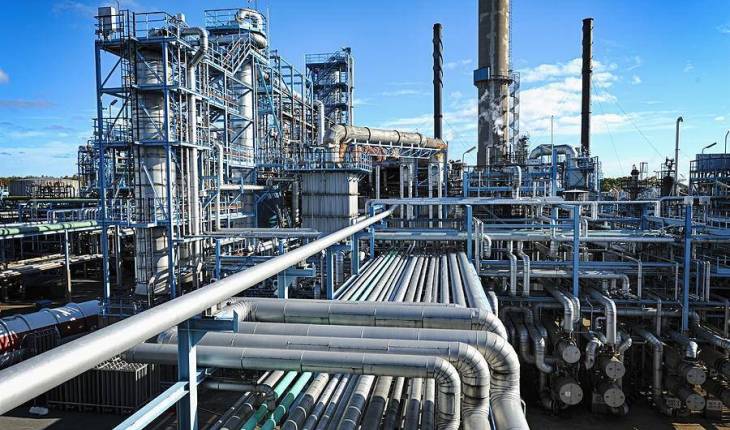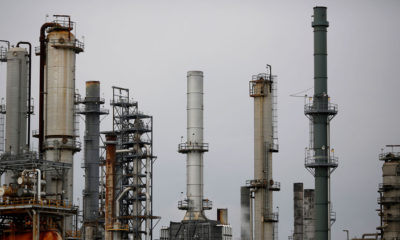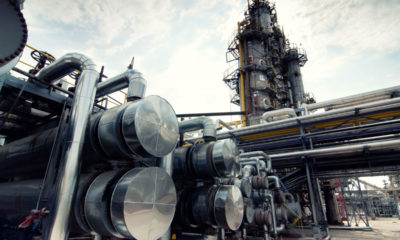A year after shutting down all of its dilapidated refineries to figure out how to fix them, Nigeria still can’t say how much it will cost to do the work or where the money will come from.
Nigerian National Petroleum Corp. said it has finished the appraisal of its largest facility, but hasn’t completed the process at two others. Refining experts said the extended halt means the plants are at risk of rotting away and unlikely to restart on time.
“Things haven’t been looking good lately,” with Nigeria’s plants probably “completely out of action for some 18 months,” said Elitsa Georgieva, Executive Director at Citac, a consultant that specializes in African refining.
The dysfunction of its domestic refineries has long put Africa’s biggest oil producer in an ironic situation. It exports large volumes of crude to plants overseas, then pays a premium to import the fuels its customers produce.
Failed Attempts
Pledges to fix the facilities have been made and broken again and again over the years. For at least a decade, NNPC’s 445,000 barrels a day of refining capacity barely processed 20% of that amount.
The latest effort to fix the refineries was supposed to be different to the failed attempts that came before. The company had totally shut all three plants down by January 2020 to do a comprehensive appraisal, and set the ambitious target of having them all back up and running at 90% of capacity by 2023.
“The refineries have been deliberately shut down to allow for a thorough diagnosis,” said Kennie Obateru, an Abuja-based NNPC spokesman. “They can be fixed based on what the diagnosis reveals.”
The appraisal of the 210,000-barrel-a day Port Harcourt refinery has been completed and NNPC has called for bids for the necessary repairs, Obateru said. The company hasn’t determined how much the work will cost.
“It is when we close the bids, everything is analyzed and presented that we will know how much we need,” he said.
The diagnosis is underway at the 125,000-barrel-a-day Warri facility and should be complete before the end of the year, he said. After that, the study of the 110,000-barrel-a-day Kaduna plant will commence.
Major Challenge
One year into the process, refining analysts are skeptical that all this work can be done by 2023.
“I don’t think anyone has a good understanding technically of what’s wrong with those refineries,” said Alan Gelder, vice president of refining, chemicals and oil markets at Wood Mackenzie Ltd. “They’re probably corroding, which makes it a very difficult proposition.”
NNPC reaffirmed its deadline and said there’s no reason the refineries, which are at least 40 years old, can’t be restored to full operation.
“There are refineries that are over a hundred years old still running, so age is not necessarily an impediment,” Obateru said.
There are parallel efforts backed by private companies to add to Nigeria’s capacity. Aliko Dangote, Africa’s richest person, is building a state-of-the-art 650,000 barrel-a-day refinery, which Citac estimates will start production in 2023.
Bringing NNPC’s Port Harcourt refinery to the same clean-fuel standards as Dangote’s modern plant would cost about $1.3 billion for the equipment, on top of whatever other repairs are required to get the facility running, Georgieva said.
NNPC is talking to oil-trading firms about $1 billion of prepayment deals that could finance the repairs at Port Harcourt, Reuters reported last week. Obateru declined to comment on the report, but said “I don’t envisage that we will have a problem getting people to invest.”

 Billionaire Watch3 weeks ago
Billionaire Watch3 weeks ago
 Startups4 weeks ago
Startups4 weeks ago
 News4 weeks ago
News4 weeks ago
 News4 weeks ago
News4 weeks ago
 Bitcoin4 weeks ago
Bitcoin4 weeks ago
 Naira4 weeks ago
Naira4 weeks ago
 Forex3 weeks ago
Forex3 weeks ago
 Treasury Bills4 weeks ago
Treasury Bills4 weeks ago























